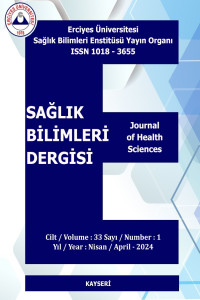Öz
The purpose of this study was to assess the practical training provided by associate degree programs in radiotherapy education in the United States, as well as the preparedness of students for internships and their post-internship learning levels. A total of 317 participants, including both face-to-face and online students, as well as graduates of the radiotherapy program, completed a survey consisting of 68 questions. Of the participants, 66.2% were female (n=210) and 33.8% were male (n=107). Lab facilities are available at institutions where the majority of participants (70.3%) have received education. Binary logistic regression tests were used to investigate whether there was a difference between the pre- and post-internship status. It was statistically significant that interns who had experienced professional growth prior to the internship performed better in achieving such gains after the internship (p < 0.05). The rate of error among participants who underwent laboratory training was 58.4% lower, and the time it took for them to begin working with patients independently was 61.1% less compared to those who were trained in an educational institution with inadequate practical training. Our survey underscores the significance of both theoretical and hands-on training in the education of radiotherapy technicians. Starting internships with theoretical training in a laboratory environment reinforces students' knowledge and improves their success during the internship. This type of training also enhances self-confidence, strengthens their connection to their profession, and prepares them for professional life after graduation.
Anahtar Kelimeler
Education opportunities experience internship radiotherapy technician vocational training
Teşekkür
We thank the participants who volunteered to participate in this study, and the Radiotherapy Technicians Association (RTT-Der) and individuals who helped this study reach participants.
Kaynakça
- Becerir HB, Gurdalli S, Yapici B, et al. Radiotherapyequipment and work force in Turkey. Turk J Oncol. 2021;36(4):512-518. doi:10.5505/tjo.2021.2896
- All Universities with Radiotherapy Programs. Higher Education Institution. https://yokatlas. yok.gov.tr/onlisans-program.php?b=30061. Published 2022. Accessed May 21, 2023.
- Yenal S, Gultekin T. Sağlık hizmetleri meslek yüksekokulu son sınıf öğrencilerinin klinik uygulamalarda karşılaştıkları güçlükler. İnönü Üniversitesi Sağlık Hizmetleri Meslek Yüksek Okulu Dergisi. 2019;7(1):58-66. doi:10.33715/inonusaglik.5475 51
- De Almeida RPP, Da Silva CA, Da CostaVicente BI, Abrantes AFCL, Azevedo KB. The paradigm shift in medical imaging education and training in Europe. IJIET. 2022;12(4):326-332. doi:10.18178/ijiet.20 22.12.4.1622
- Yüksel A. Sağlık hizmetleri meslek yüksekokulu öğrencilerinin uygulamalı derslere ilişkin görüşleri. JOHSE. 2018;2(2):72-77. doi:10.26567/JOHSE. 2018250153
- Flinton D. Competency based assessment using a virtual environment for radiotherapy. Procedia Comput Sci. 2013;25:399-401. doi:10.1016/j. procs.2013.11.049
- Hosgor H. Sağlık hizmetleri alanında sanal gerçekliğin kullanımı: Türkiye ve dünyadan örnekler. Fenerbahçe Üniversitesi Sağlık Bilimleri Dergisi. 2022;2(3):647-660. doi:10.56061/fbujohs.11519 00
- Tunc Y, Dal M. Sağlık hizmetleri meslek yüksekokulu öğrencilerinin yaz stajı Hakkındaki Görüş ve Önerileri: Iğdır Üniversitesi örneği. Researcher: Social Science Studies. 2018;6(3):377-403. doi:10. 18301/rss.683
- Bostan S, Yildirmis S. Sağlık teknikerleri meslek eğitiminin sektörel değerlendirilmesi. TISK Akademi Dergisi. 2008;3(6):280-291.
- Siddique S, Chow JCL. Artificialintelligence in radiotherapy. Rep Pract Oncol Radiother. 2020;25(4):656-666. doi:10.1016/j.rpor.2020.03.015
Öz
Ülkemizde radyoterapi eğitimi veren önlisans programlarının uygulamalı eğitimleri ile öğrencilerin staja hazır bulunuşlukları ve staj sonrası öğrenme düzeylerinin değerlendirilmesi amaçlanmıştır. Radyoterapi programında okuyan önlisans öğrencilerine ve mezunlarına yüz yüze ve online olarak uygulanan 68 soruluk anket değerlendirmeye alınmıştır. Ankete toplam 317 kişi katıldı. Katılımcıların %66.2'si kadın (n=210) ve %33.8'i erkektir (n=107). Katılımcıların %70.3'ünün eğitim gördüğü kurumlarda laboratuvar olanakları mevcuttur. Staj öncesi ve sonrası durumun karşılaştırılmasında fark bulunup bulunmadığı binarylojistik regresyon testleri kullanılarak araştırılmıştır. Staj öncesinde mesleki kazanımlar yaşamalarının staj sonrasında bu kazanımları daha iyi elde etmelerini sağladığı istatistiksel olarak anlamlı bulunmuştur (p<0.05). Laboratuvar eğitimi alan katılımcıların hata oranı ve tek başına hasta almaya başlama süresi, uygulama eğitimi yetersiz olan bir eğitim kurumunda eğitim alan katılımcılara göre istatistiksel olarak sırasıyla %58.4 ve %61.1 daha azdı. Araştırmamız, radyoterapi teknikerlerinin eğitiminde hem teorik hem de pratik eğitimin gerekli olduğunu göstermektedir. Öğrencilerin aldıkları bilgileri laboratuvar ortamında teorik eğitimle pekiştirerek staja başlamaları staj süresince daha başarılı olmalarını sağlamaktadır. Staj eğitimi ile öğrenciler özgüven kazanır, mesleğine daha yakın hisseder ve iş hayatına hazır hale gelir.
Anahtar Kelimeler
Eğitim imkanları tecrübe staj radyoterapi teknikeri mesleki eğitim
Kaynakça
- Becerir HB, Gurdalli S, Yapici B, et al. Radiotherapyequipment and work force in Turkey. Turk J Oncol. 2021;36(4):512-518. doi:10.5505/tjo.2021.2896
- All Universities with Radiotherapy Programs. Higher Education Institution. https://yokatlas. yok.gov.tr/onlisans-program.php?b=30061. Published 2022. Accessed May 21, 2023.
- Yenal S, Gultekin T. Sağlık hizmetleri meslek yüksekokulu son sınıf öğrencilerinin klinik uygulamalarda karşılaştıkları güçlükler. İnönü Üniversitesi Sağlık Hizmetleri Meslek Yüksek Okulu Dergisi. 2019;7(1):58-66. doi:10.33715/inonusaglik.5475 51
- De Almeida RPP, Da Silva CA, Da CostaVicente BI, Abrantes AFCL, Azevedo KB. The paradigm shift in medical imaging education and training in Europe. IJIET. 2022;12(4):326-332. doi:10.18178/ijiet.20 22.12.4.1622
- Yüksel A. Sağlık hizmetleri meslek yüksekokulu öğrencilerinin uygulamalı derslere ilişkin görüşleri. JOHSE. 2018;2(2):72-77. doi:10.26567/JOHSE. 2018250153
- Flinton D. Competency based assessment using a virtual environment for radiotherapy. Procedia Comput Sci. 2013;25:399-401. doi:10.1016/j. procs.2013.11.049
- Hosgor H. Sağlık hizmetleri alanında sanal gerçekliğin kullanımı: Türkiye ve dünyadan örnekler. Fenerbahçe Üniversitesi Sağlık Bilimleri Dergisi. 2022;2(3):647-660. doi:10.56061/fbujohs.11519 00
- Tunc Y, Dal M. Sağlık hizmetleri meslek yüksekokulu öğrencilerinin yaz stajı Hakkındaki Görüş ve Önerileri: Iğdır Üniversitesi örneği. Researcher: Social Science Studies. 2018;6(3):377-403. doi:10. 18301/rss.683
- Bostan S, Yildirmis S. Sağlık teknikerleri meslek eğitiminin sektörel değerlendirilmesi. TISK Akademi Dergisi. 2008;3(6):280-291.
- Siddique S, Chow JCL. Artificialintelligence in radiotherapy. Rep Pract Oncol Radiother. 2020;25(4):656-666. doi:10.1016/j.rpor.2020.03.015
Ayrıntılar
| Birincil Dil | İngilizce |
|---|---|
| Konular | Radyoterapi, Sağlık Fiziği, Tıp Eğitimi |
| Bölüm | Araştırma Makalesi |
| Yazarlar | |
| Erken Görünüm Tarihi | 2 Nisan 2024 |
| Yayımlanma Tarihi | 1 Nisan 2024 |
| Gönderilme Tarihi | 27 Temmuz 2023 |
| Yayımlandığı Sayı | Yıl 2024 Cilt: 33 Sayı: 1 |


